|
|
|
Sort Order |
|
|
|
Items / Page
|
|
|
|
|
|
|
| Srl | Item |
| 1 |
ID:
139540
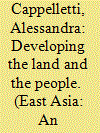

|
|
|
|
|
| Summary/Abstract |
Social development in Xinjiang Uyghur Autonomous Region from 1999 to 2009 is the focus of this article. I will explore the current situation among Uyghurs and Hans living in Xinjiang in different social contexts and purviews, mainly assessing problems and open questions hindering a balanced and consensus-based social development in the area. The concept of “development” per se will be understood with a critical perspective. The fieldwork was conducted in 2011 and 2012 in Urumqi, Turpan, Kahsgar, Wujiaqu and Shihezi, and in eight rural villages—seven located in the Kashgar Prefecture and one in Kizilsu Kyrgyz Autonomous Prefecture. The opportunity to adopt an “insider perspective”, at the same time working with critical tools provided by the disciplines of sociology and anthropology, can be considered an important asset in the field of Xinjiang studies. My PhD research in China (2010–2013) and my work as consultant for KFW (2011–2012) have been of great help in adopting this approach. Interviews, participant observation and analysis of quantitative and qualitative data from different sources are the basis of the fieldwork results presented here. UNDP indicators and indexes are taken as reference in setting and organising data.
|
|
|
|
|
|
|
|
|
|
|
|
|
|
|
|
| 2 |
ID:
119708
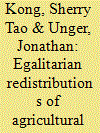

|
|
|
| 3 |
ID:
149923
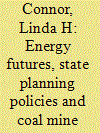

|
|
|
|
|
| Summary/Abstract |
The United Nations 2015 Climate Change Conference established a framework for keeping global temperature increase “well below” two degrees Celsius through commitments by the parties to significant reductions in greenhouse gas emissions. The agreement has implications for the energy policies of all countries, not least major coal exporters like Australia. By contrast, the government's 2015 Energy White Paper lays out the vision for the country's future as a “global energy superpower” dominated by the export of fossil fuels for decades to come. Legislative frameworks around planning, land use, mining, heritage and environment have moved in synchrony with this agenda. Rural landowners in the big coal rich geological basins of Australia are directly impacted by current government policies on energy exports and on domestic supply. This article follows the coal value chain to rural communities in New South Wales where new mines are being built, and analyses the politics of land use, natural resources and energy from the vantage point of landowner engagement with government and corporations in the policy, legislative and regulatory domains. The need for more equitable, democratic and precautionary approaches to energy policy, heritage and environmental planning and agricultural land use is highlighted.
|
|
|
|
|
|
|
|
|
|
|
|
|
|
|
|
| 4 |
ID:
130578


|
|
|
|
|
| Publication |
2014.
|
| Summary/Abstract |
In the context of mineral extraction in South East Asia, the rural poor are generally portrayed as victims of large, invading corporatized mining enterprises. However, this paper argues that local villagers have also shown considerable agency in taking advantage of the mineral resource boom by diversifying their livelihoods to include informal mining. In South East Asia, the growth of informal mining has occurred within the overall process of agrarian transition. This paper focuses on a mineral-rich valley in southern Laos to highlight the location-specific nature of such transitions. The valley's environmental transformation has both caused and accompanied a modification in the peasant ways of life, and the recent entry of transnational mining companies and the growing market price of tin have fundamentally altered the relationships of the peasants with place, while at the same time encouraging them to claim mineral resource rights in ways that are not accommodated in conventional mining legislation. To conclude, the paper notes the multiple interpretations and contradictions of the increasing mineral dependence among Lao peasants in a rapidly changing world.
|
|
|
|
|
|
|
|
|
|
|
|
|
|
|
|
| 5 |
ID:
125204


|
|
|
|
|
| Publication |
2013.
|
| Summary/Abstract |
Vietnam's rural provinces are home to thousands of craft villages; communities engaged in small- and medium-scale manufacturing of a range of goods, from recycled paper products to processed food. Since the liberalization of the Vietnamese economy in 1986, craft villages have played a significant role in poverty reduction and livelihood diversification for rural households, and currently employ nearly one-third of Vietnam's rural labor force. However, the rapid expansion of craft manufacturing, combined with a lack of planning, has brought increased air, soil, and water pollution to craft villages and surrounding areas. Pollution levels are now so serious that they pose a major risk to local health and agriculture. This article examines why producers continue to expose themselves to environmental pollution and its associated health risks. Drawing on four case studies of craft villages in the Red River Delta region of northern Vietnam, the authors find that risk is a multidimensional phenomenon. Craft production typically involves a value chain of closely connected family economic units and takes place against a backdrop of fierce competition for market share both within Vietnam and elsewhere in Asia. In this context, the current policy of managing the environmental risks of pollution through regulation requires producers to take risks in other domains of equal or greater importance to them; their livelihoods and social relations. Craft producers make explicit trade-offs between the risks of ill health and the security that family and community ties provide in the face of uncertain production space, markets, and livelihoods. These findings highlight the importance of thinking
|
|
|
|
|
|
|
|
|
|
|
|
|
|
|
|
| 6 |
ID:
140969
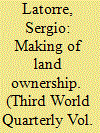

|
|
|
|
|
| Summary/Abstract |
Hernando de Soto’s best-selling book The Mystery of Capital argues that economically disadvantaged countries lack institutional arrangements that can spur economic development and capital growth. This article questions de Soto’s institutional economist account. It draws on a 14-month ethnographic study performed at two rural field sites in Colombia and in the central government office responsible for promoting land programmes designed to improve the living conditions of rural communities. This study, which focuses on the daily practices of public officials and rural campesinos, suggests the importance of the title document, and in particular the public deed, for land ownership. It describes the process by which landownership is created by the issuance of the land title document and highlights some important elements and untended consequences that are often neglected in this process of making land a legal and economic asset.
|
|
|
|
|
|
|
|
|
|
|
|
|
|
|
|
| 7 |
ID:
178826


|
|
|
|
|
| Summary/Abstract |
Wind power development has rapidly expanded in rural areas in the United States. Numerous studies addressing the impacts of wind development on rural communities focus on overall economic, environmental, and social effects (Brown et al., 2012; Kahn, 2013; Mulvaney et al., 2013). This research builds on those to add the impacts of substantial wind power development on community services and the cost of living, focusing on eleven rural counties with wind energy development over 1000 MW in five different states in the U.S. The research uses descriptive statistical analysis to document county-level changes in the population size, employment, and poverty rate before and after hosting substantial wind projects from 1990 to 2015. Qualitative analysis of interviews and county documents identified data on and perceptions of the impacts of the wind projects on tax revenues as well as community services. We find that wind development tax income improved community services without any noticeable increases in required community services or cost of living. From a policy perspective, these results are most relevant for local governors and planners, who seek to balance the cost and benefits of wind farms to the rural community.
|
|
|
|
|
|
|
|
|
|
|
|
|
|
|
|
| 8 |
ID:
173251
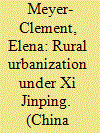

|
|
|
|
|
| Summary/Abstract |
‘Rural community building’ is one of the most prominent policies of rural urbanization and village renovation in China. Since the nationwide implementation of this policy within the scope of the programme ‘Building a new socialist countryside’, the large-scale construction of new residential complexes has accelerated the transformation of the country’s rural landscape. However, extensive demolition and relocation have drawn increasing criticism, and the policy has become synonymous with the seizure of rural land resources by local governments. When Xi Jinping came to power, the new leadership initially appeared to abandon the policy but has eventually revived it. This article studies the implementation and evolution of the rural community building policy as a case of policy learning. The analysis of national and local policy documents and implementation practices in four provinces highlights a new framing of the policy, more intensive hierarchical controls over rural land use, and the state’s increasing reach into village governance, as well as new incentives for local governments to continue with demolition and relocation projects. These changes reveal a mode of policy learning in the context of an authoritarian regime whose goal is to improve policy implementation in the face of growing public criticism and social tension.
|
|
|
|
|
|
|
|
|
|
|
|
|
|
|
|
| 9 |
ID:
142005
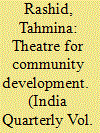

|
|
|
|
|
| Summary/Abstract |
Street theatre has always been a significant feature in the lives of rural communities as the only source of entertainment especially in the post-harvest season. In many parts of South Asia and Africa, it has been increasingly utilised as an awareness raising and development tool by civil society and development organisations. This paper would explore street theatre in the context of Pakistan, where it has been revitalised by organisations like Lok Rahs and Ajoka. Lok Rahs has primarily focused on the needs of rural communities and remains committed to their concerns regarding health but also human rights especially women and the disadvantaged. Ajoka, on the other hand, is a professional organisation, performing in formal as well as informal settings, focusing on socio-political concerns as well as human rights issues. This article would examine the contributions of both the groups in the broader context of feminist movement in Pakistan, looking at their role as change agents in the development of rural communities in Punjab province.
|
|
|
|
|
|
|
|
|
|
|
|
|
|
|
|
| 10 |
ID:
116002
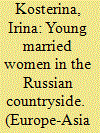

|
|
|
|
|
| Publication |
2012.
|
| Summary/Abstract |
This essay explores the experiences of recently married young women living in rural Russia in the village of Karsun in the Ul'yanovsk Oblast'. It analyses the connections between women in rural communities looking at social networks and the power relations inherent within them. The ways in which forms of power among and between women (as well as between women and men) impact on young women's agency are critically appraised through an analysis of what this essay terms forms of 'women's power'. The essay also shows how women's discussions of their experiences reflect the problems that the perceived physical and emotional absences of men present for younger married women and their attempts to develop forms of autonomy.
|
|
|
|
|
|
|
|
|
|
|
|
|
|
|
|
|
|
|
|
|